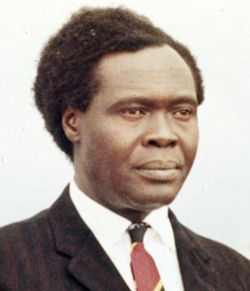The Election of 1980
 Shortly after Muwanga's 1980 coup, Obote made a triumphant return from Tanzania. In the months before the December elections, he began to rally his former UPC supporters. Ominously, in view of recent Ugandan history, he often appeared on the platform with General Ojok, a fellow Langi. Obote also began to speak of the need to return to a UPC one-party state.
Shortly after Muwanga's 1980 coup, Obote made a triumphant return from Tanzania. In the months before the December elections, he began to rally his former UPC supporters. Ominously, in view of recent Ugandan history, he often appeared on the platform with General Ojok, a fellow Langi. Obote also began to speak of the need to return to a UPC one-party state.
The national election on December 10, 1980, was a crucial turning point for Uganda. It was, after all, the first election in eighteen years. Several parties contested, the most important of which were Obote's UPC and the DP led by Paul Kawanga Ssemogerere. Most of Uganda's Roman Catholics were DP members, along with many others whose main concern was to prevent the return of another Obote regime. Because the Military Commission, as the acting government, was dominated by Obote supporters (notably chairman Paulo Muwanga), the DP and other contenders faced formidable obstacles.
By election day, the UPC had achieved some exceptional advantages, summarized by Minority Rights Group Report Number 66 as follows. Seventeen UPC candidates were declared "unopposed" by the simple procedure of not allowing DP or other candidates to run against them. Fourteen district commissioners, who were expected to supervise local polling, were replaced with UPC nominees. The chief justice of Uganda, to whom complaints of election irregularities would have to be made, was replaced with a UPC member.
In a number of districts, non-UPC candidates were arrested, and one was murdered. Even before the election, the government press and Radio Uganda appeared to treat the UPC as the victor. Muwanga insisted that each party have a separate ballot box on election day, thus negating the right of secret ballot. There were a number of other moves to aid the UPC, including Muwanga's statement that the future parliament would also contain an unspecified number of unelected representatives of the army and other interest groups.
Polling appeared to be heavy on election day, and by the end of the voting, the DP, on the basis of its own estimates, declared victory in 81 of 126 constituencies. The British Broadcasting Corporation and Voice of America broadcast the news of the DP triumph, and Kampala's streets were filled with DP celebrants. At this point, Muwanga seized control of the Electoral Commission, along with the power to count the ballots, and declared that anyone disputing his count would be subject to a heavy fine and five years in jail. Eighteen hours later, Muwanga announced a UPC victory, with seventy-two seats.
Some DP candidates claimed the ballot boxes were simply switched to give their own vote tally to the UPC runner-up. Nevertheless, a small contingent of neutral election watchers, the Commonwealth Observer Group, declared itself satisfied with the validity of the election. Some Ugandans criticized the Commonwealth Observer Group, suggesting that members of the group measured African elections by different standards than those used elsewhere or that they feared civil war if the results were questioned. Indeed, popular perception of a stolen election actually helped bring about the civil war the Commonwealth Observer Group may have feared.
|
NEWSLETTER
|
| Join the GlobalSecurity.org mailing list |
|
|
|

